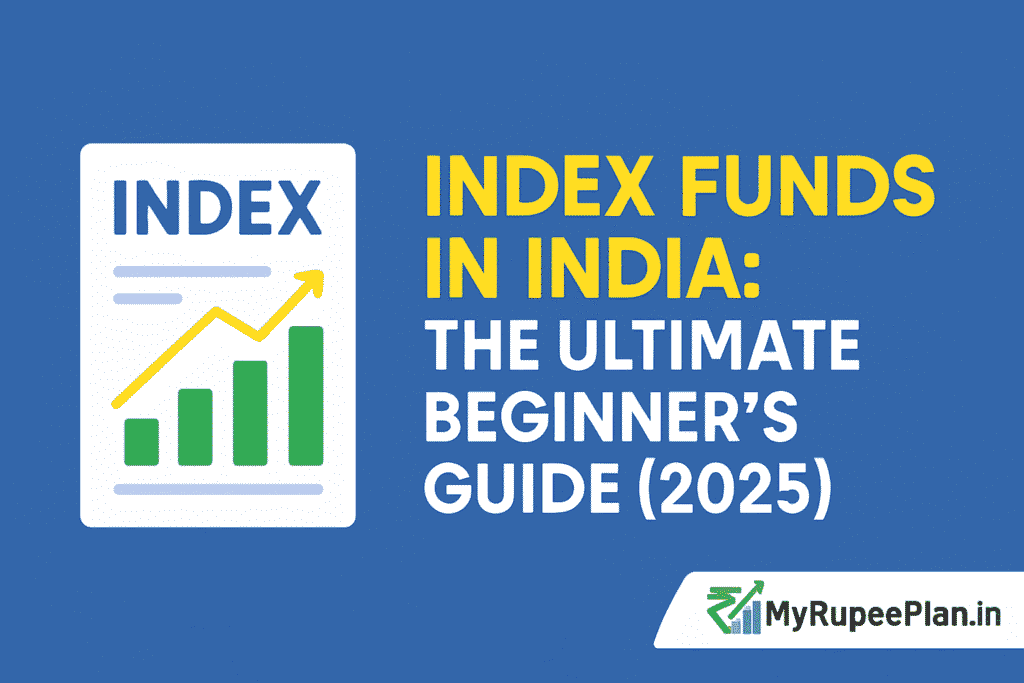Index Funds in India: The Ultimate Beginner’s Guide (2025)
Introduction
If you’ve been exploring investment options in 2025, you’ve probably come across the term index funds in India. They are one of the simplest and most cost-effective ways to grow wealth, especially for beginner investors. But what exactly are index funds? How do they work? And why are they so popular among Indian investors today? Let’s break it down.
What Are Index Funds?
Index funds are a type of mutual fund that aim to replicate the performance of a specific market index, such as the Nifty 50 or Sensex. Instead of actively selecting stocks, the fund simply invests in the same companies that are part of the index, in the same proportion.
Example:
If the Nifty 50 index includes Reliance Industries, HDFC Bank, and Infosys, an index fund tracking Nifty 50 will also invest in those companies in the same weightage.
How Do Index Funds Work in India?
The goal of index funds in India is not to beat the market, but to match market returns. Fund managers don’t make buy-sell decisions based on market predictions. Instead, they rebalance the portfolio whenever the index changes.
Key Features:
- Passive Management: Minimal human intervention
- Low Expense Ratio: Costs are usually between 0.1% to 0.3% annually
- Diversification: Exposure to multiple companies at once
- Transparency: Easy to track since holdings match the index
Types of Index Funds in India
Index funds in India can be classified based on the index they track:
1. Equity Index Funds
- Track indices like Nifty 50, Sensex, Nifty Next 50
- Suitable for long-term equity investors
2. Sectoral Index Funds
- Track sector-specific indices like Nifty Bank, Nifty IT
- Best for investors confident in a sector’s growth
3. Debt Index Funds
- Track bond indices
- Lower risk compared to equity index funds
4. International Index Funds
- Track global indices like S&P 500
- Help diversify investments beyond India
Benefits of Index Funds in India
Index funds have gained huge popularity due to their many advantages:
- Low Cost: Passive management keeps expenses minimal
- Market Returns: Match the benchmark over time
- Diversification: Reduces risk by investing in multiple companies
- Simple to Understand: Perfect for beginners
- Consistent Performance: Less volatile than actively managed funds in the long run
Risks of Index Funds
Index funds have gained huge popularity due to their many advantages:
- Low Cost: Passive management keeps expenses minimal
- Market Returns: Match the benchmark over time
- Diversification: Reduces risk by investing in multiple companies
- Simple to Understand: Perfect for beginners
- Consistent Performance: Less volatile than actively managed funds in the long run
Best Index Funds in India (2025)
| Fund Name | Benchmark | Expense Ratio |
|---|---|---|
| Nippon India Index Fund – Nifty 50 Plan | Nifty 50 | 0.20% |
| HDFC Index Fund – Sensex Plan | Sensex | 0.25% |
| UTI Nifty 50 Index Fund | Nifty 50 | 0.18% |
| Motilal Oswal Nasdaq 100 Fund | Nasdaq 100 | 0.40% |
How to Invest in Index Funds in India
Investing in index funds is easy and can be done in two main ways:
1. Through an AMC (Mutual Fund House)
- Visit the fund house website
- Complete KYC
- Start a SIP or lump sum investment
2. Through Online Platforms
- Use apps like Groww, ET Money, or Paytm Money
- Compare expense ratios and tracking errors before investing
Taxation on Index Funds
1. Equity Index Funds:
- Short-Term (less than 1 year): 15% tax
- Long-Term (more than 1 year): 10% tax on gains above ₹1 lakh
2. Debt Index Funds:
- Taxed as per your income tax slab
Tips for Beginners Investing in Index Funds
- Start with a broad market index fund like Nifty 50 or Sensex
- Prefer SIP over lump sum to average out market volatility
- Compare expense ratios before choosing a fund
- Stay invested for at least 5–7 years for best results
Conclusion
Index funds in India are a great choice for beginners looking for simple, low-cost, and diversified investments. They take the guesswork out of stock picking while giving you exposure to the best companies in the market. In 2025, with increasing investor awareness and low expense ratios, index funds are expected to grow even more popular.
FAQs About Index Funds in India
Q1: Are index funds good for beginners in India?
Yes, they are low-cost, diversified, and easy to understand.
Q2: Which is better, Nifty 50 index fund or Sensex index fund?
Both perform similarly; choose based on preference.
Q3: What is the minimum amount to start investing in index funds?
Q4: Are index funds in India safe?
They are market-linked, so they carry risk, but are safer than investing in single stocks.

